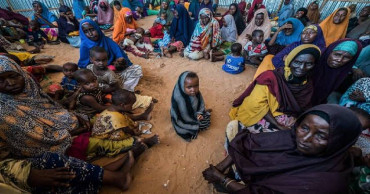Aid agencies
US urged to help more people escape Taliban-led Afghanistan
A coalition of organizations working to evacuate people who could be targeted by the Taliban rulers in Afghanistan appealed Monday for more assistance from the U.S. government and other nations as conditions deteriorate in the country.
Members of the AfghanEvac Coalition met in a video call with Secretary of State Antony Blinken to press the case for additional resources to help tens of thousands of people get out of Afghanistan, now faced with a deepening economic and humanitarian crisis in addition to a precarious security situation following the U.S. withdrawal.
Participants said afterward they were grateful for what the State Department has done so far, including helping to arrange a series of evacuation flights for U.S. citizens and residents since the withdrawal, but more will be needed in the months ahead.
Read: Allow unimpeded aid into Afghanistan, say NSAs in Delhi Declaration
“The State Department doing enough isn’t enough; we need whole of government solutions; we need the international community to step up and we need it quickly,” said Peter Lucier, a former Marine who served in Afghanistan who works with coalition-member Team America. “Winter is coming. There is a famine already. ”
Private groups, particularly with ties to the veteran community, have played an important role in the evacuation and resettlement of tens of thousands of Afghans since the U.S. ended its longest war and the government fell to the Taliban. Members of the coalition, which includes about 100 organizations, have been working to help people get on the scarce flights out of the country and helping them get settled in communities once they reach the United States.
State Department spokesman Ned Price said the call included discussion of what he called “our collective efforts” to aid visa holders and applicants and to “facilitate the departure of these individuals who are at a stage where it is appropriate to do so.”
About 82,000 people have come to the U.S. so far under what the Biden administration calls Operation Allies Welcome. The Department of Homeland Security said 10% were American citizens or permanent residents.
The rest were a combination of people who had obtained special immigrant visas, for those who had worked for the U.S. government as interpreters or in some other capacity; people applying for one of the visas but who hadn’t yet received it; or other Afghans who might be vulnerable under the Taliban, such as journalists or government officials, and qualified to come as refugees. Nearly half were children.
As of Monday, DHS said about 46,000 are still being housed at domestic U.S. military bases until they can be resettled by private refugee organizations around the country. Another 2,600 remain at overseas transit points, dubbed “lily pads,” as they undergo security vetting and health screening before coming to the U.S.
Read: In Afghanistan, a girls’ school is the story of a village
The State Department said separately Monday that some people coming to the U.S. from countries other than Afghanistan under the broader refugee program would be temporarily delayed so refugee agencies can focus on resettling Afghans. The pause would run through Jan. 11 and won’t apply to certain categories, including urgent cases, family reunifications and those who have already made travel arrangements.
The AfghanEvac Coalition has urged the U.S. government to establish more of the “lilly pads,” and work with other nations to create more pathways for people to reach safety. It’s unclear how many people need to be evacuated but organizations have estimated the number conservatively in the tens of thousands. Aid agencies said about 300,000 have fled Afghanistan into Iran, including many members of Shiite communities seeking refuge from both the Taliban and attacks by the Islamic State affiliate in the country.
Lucier and Shawn VanDiver, a founder of the coalition, said without providing specifics that they raised “specific stumbling blocks” and “choke points,” that are preventing people from reaching safety in the U.S. or elsewhere. Both said it will require more time and input from other parts of the government to solve those problems.
“The answers are complex,” Lucier said. “There are no simple technical fixes to a lot of this.”
The meeting takes place against a backdrop of intense criticism by some Republicans in Congress, attacking a frantic evacuation, which was set in motion by President Donald Trump’s decision to sign a peace deal with the Taliban and set a withdrawal date, and for what they have alleged is insufficient vetting of refugees. They have also accused the administration of understating the number of American citizens left behind.
Republicans on the House Foreign Affairs Committee wrote Blinken on Monday seeking interviews with more than 30 State Department officials to address what they called the “many unanswered questions about the planning – or lack thereof – that preceded the drawdown and evacuation.” Those include the number of American citizens and residents still in Afghanistan and mechanisms for continued evacuations.
Read: US set to appeal UK refusal to extradite WikiLeaks' Assange
As of Monday, the U.S. has assisted the departure of 435 American citizens and 325 permanent residents since Aug. 31, including with some recent flights, Price said.
Blinken said Friday that the U.S. has offered the opportunity to leave Afghanistan to all American citizens and permanent residents it has identified as remaining in the country who wish to depart and have appropriate travel documents. Several hundred Americans are reported to still be in Afghanistan, though not all have indicated they want to leave, Biden administration officials have said.
The Gulf nation of Qatar has agreed to represent the United States in Taliban-run Afghanistan following the closure of the American Embassy in Kabul and will handle consular services for American citizens in Afghanistan and will deal with routine official communications between Washington and the Taliban government.
4 years ago
Rohingya camp fire: Humanitarian community calls for compassion
The humanitarian community has called for compassion for Rohingyas in Bangladesh as a massive fire ravaged through camps leaving thousands destitute.
"We’re calling for a show of compassion and solidarity towards the Rohingya refugee population during this very difficult time," the community said in a joint press statement on Tuesday night.
Inter Sector Coordination Group (ISCG) issued the joint press statement.
It said they are deeply concerned about the safety and wellbeing of tens of thousands of Rohingya refugees in Bangladesh left destitute by the fire that raged through four camps on March 22.
Fire services and civil defence, emergency and response teams and aid agencies rushed to the areas affected by the fire and helped move refugees to safer locations, the statement reads.
"Tragically, reports from the camps indicate that at least 11 people are said to have lost their lives in the fire and more than 500 others have been injured. Around 400 people are unaccounted for," it said.
Also read: Rohingya camp fire: Death toll climbs to 11
The government authorities and aid agencies worked throughout the night to help those impacted and assess damages in the camps.
The refugees who fled the fires are taking shelter in various locations.
Many are staying with relatives or in learning and transit centres which are accommodating the most vulnerable people.
The government of Bangladesh and aid agencies are providing water, hot meals and high energy biscuits as well as emergency healthcare to those affected.
The fire consumed shelters and personal belongings of refugees as well as essential facilities such as hospitals, primary health facilities, learning centres, and women-friendly spaces in the camps.
"Teams on the ground say the scale and intensity of the fire is unlike anything seen before in the camps," the statement said.
Also read: Fire at Rohingya camp caused 'enormous devastation': UNICEF
Some 24 hours into the response, preliminary assessments by aid agencies have found that some 10,000 Rohingya refugee families (approximately 45,000 persons) were displaced and a similar number of shelters have been damaged or destroyed in the camps as a result of the fire. Assessments are still ongoing.
"As the humanitarian response continues, healthcare and mental health support is being provided to those who’ve been injured or experienced stress as well as first line responders."
Moving forward, it said, the priority will be to reunite families and children who were separated during the fire and the subsequent movements to safe places, as well as to identify and support persons with specific needs, such as older persons, pregnant women and persons with disabilities.
Aid agencies are also monitoring the safety conditions of refugees to mitigate risks, as they remain vulnerable to incidents of theft, harassment, and exploitation.
Another priority for authorities and humanitarian actors will be to replace the key documentation that Rohingya refugees lost in the fire, it said.
Rescue efforts proved to be challenging as a result of the presence of perimeter fencing. In some instances, refugees themselves cut through the fence to escape the fire.
Also read: Fire breaks out at Rohingya camp in Ukhiya
Limited mobile connectivity in the camps also hampered the ability of refugees to call for immediate assistance and contact their families, the statement said.
"It also continues to limit the coordination of the aid response."
Refugee volunteers are playing an invaluable role in the response.
They are the first responders, helping people to safety, supporting fire response efforts and continue to work to support aid efforts on the ground.
The humanitarian community is urging the public to respect privacy of those Rohingya refugee families who have either lost family members or have been impacted by fires.
4 years ago
Aid agencies seek solutions to climate emergency needs in Somalia
Aid agencies operating in Somalia on Saturday called on the international community to urgently address climate emergency needs in the Horn of Africa nation.
6 years ago





